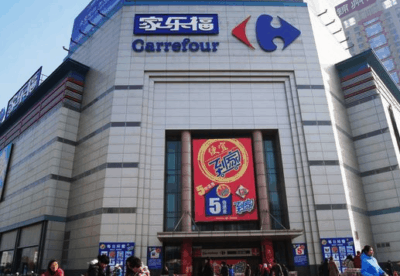
Suning chairman Zhang Jindong
Chinese retailer Suning.com has agreed to buy an 80 percent stake in Carrefour Group’s China unit for RMB 4.8 billion ($699 million) in cash, according to an announcement to the Shenzhen stock exchange.
The agreement paves the way for the loss-making French retailer to follow other big-name Western players such as Tesco on the pathway out of the China market.
The acquisition is the latest step in an expansion by Nanjing-based Suning, which just four months ago purchased 37 department stores from Dalian Wanda for an amount estimated to be less than RMB 8 billion ($1.18 billion) as it strives to diversify beyond its roots in home appliance sales.
Carrefour Marked Down After Disappointing 2018
The acquisition agreement puts an enterprise value of €1.4 billion ($1.6 billion) on the French hypermarket operator’s China business, according to a statement by Carrefour on Sunday.
With the company’s 210 hypermarkets and 24 convenience stories generating net sales of RMB 28.5 billion in 2018 and EBITDA of RMB 516 million, the deal applies a mutliple of around 0.2 time the company’s sales last year — well below the industry average of 0.6 percent, according to analysts.
The mark-down on Carrefour comes in part because of the 5.9 percent slide that its sales suffered last year, some 23 years after first entering the China market.
Carrefour will retain a 20 percent stake in the business and two seats out of seven on the China unit’s Supervisory Board, although it has been given “several liquidity windows” should it decide to exit China entirely, according to its statement.
Suning Expansion Continues
Alibaba-backed Suning has grown in recent years from a home appliance seller into one of China’s largest retailers, thanks to its network of 8,815 locations across China at the end of 2018, including appliance and convenience stores.

Carrefour is the latest foreign retailer to exit the China market
Suning said in the filing that its agreement with Carrefour will “reinforce the market competitiveness of its fast-moving consumer goods operations, while reducing the costs of procurement and delivery.” The company added that it will digitise the existing Carrefour stores and integrate its online and offline shopping experience.
The deal also put an end to Carrefour’s one and half year long discussion with Chinese tech giant Tencent to sell a minority stake in its China business, although “a strategic business partnership with Tencent remained in place,” a Carrefour spokeswoman told Reuters.
Last May, Carrefour opened its first-ever smart supermarket in Shanghai in partnership with Tencent with an agreement in place to cooperate on data, smart retail, mobile payment and in-store experience.
Carrefour’s roughly 30 million registered customers in China will now be introduced to Suning services and stores, and the mainland retailer will use Carrefour’s six large distribution centres in the country to deliver products more efficiently.
Suning indicated that no restructuring is in the offing any time soon, stating that Carrefour China will remain independent in its management for now and that there will be no major changes in payroll or real estate leases.
French Chain the Latest to Calls It Quits
After entering China in 1995, Europe’s largest retailer, however, has spent years trying to fix its mainland business, with the company suffering an operating loss of €32 million last year.
A growing number of European and American retailers have either scaled back their presence or tied up with local partners in order to stay competitive in China, where e-commerce penetration is among the highest globally. Walmart Inc, which has a network of around 400 supermarkets, has taken a 10 percent stake in JD.com after selling its Yihaodian retail website to the Chinese e-commerce operator in 2016, while Germany’s Metro AG is taking bids from buyers interested in acquiring a majority stake in its Chinese business.
Nanjing-based Suning, primarily an electronics retailer, has been racing to diversify. It closely allies itself with e-commerce giant Alibaba, which holds a 20 percent stake in the company, with the goal of building an integrated online and offline retail empire.
Just over one year ago, the Nanjing-based retailer joined with Tencent, JD.com and developer Sunac China to purchase a 14 percent stake in Dalian Wanda Commercial Properties (now Wanda Commercial Management) for RMB 34 billion.
The group, chaired by Zhang Jindong, also got together with China Evergrande Group, the nation’s third-largest developer by sales, last year in a RMB 20 billion joint venture to develop Suning.com Plazas (苏宁易购广场) to promote Suning’s smart retail services. The retailer has stated a goal of having 300 of these shopping centres by 2020.
That deal with Evergrande, came two months after Suning inked an agreement with rival property giant Country Garden, under which Suning will open 600 stores in Country Garden’s properties.
Note: an earlier version of this article implied that Walmart was among the foreign retailers to exit China, while the company maintains its network of physical stores after selling its online retail business. Mingtiandi regrets the misunderstanding.
Leave a Reply